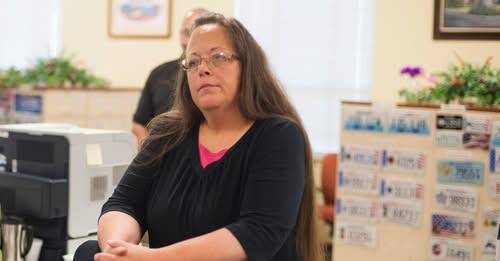
In a quiet but decisive move, the U.S. Supreme Court on Monday reaffirmed its commitment to the constitutional right to same-sex marriage by refusing to hear an appeal from Kim Davis, the former Kentucky county clerk who gained national attention in 2015 for refusing to issue marriage licenses to same-sex couples. The court’s brief order, issued without comment, effectively ends Davis’s long-running legal battle and leaves the precedent set by Obergefell v. Hodges untouched.
Davis, who served as the Rowan County clerk, became a lightning rod in the national debate over religious liberty and LGBTQ+ rights when she defied the Supreme Court’s ruling by refusing to issue marriage licenses to gay couples, citing her religious beliefs. Her actions sparked protests, lawsuits, and widespread media coverage, culminating in a federal jury awarding $100,000 in damages to one couple she denied a license.
In her latest legal maneuver, Davis petitioned the Supreme Court to not only overturn the damages verdict but to reconsider the Obergefell decision itself. Her attorneys argued that the 2015 ruling was a “mistake” and urged the justices to correct it. “The Court can and should fix this mistake,” they wrote in court filings.
However, the justices declined to take up the case, issuing a two-sentence order that offered no explanation and included no dissents. The decision came as part of the court’s weekly closed-door conference, where justices review dozens of petitions for consideration. Davis’s appeal was among those quietly denied.
The refusal to hear the case is significant not only for its legal implications but also for its symbolic weight. It signals that despite shifts in the court’s ideological makeup, the justices are not currently inclined to revisit one of the most consequential civil rights decisions of the 21st century. The Obergefell ruling, which held that the 14th Amendment guarantees same-sex couples the right to marry, has since become a cornerstone of LGBTQ+ legal protections in the United States.
LGBTQ+ advocacy groups hailed the court’s decision as a victory for equality and a reaffirmation of hard-won rights. “This is a powerful reminder that love is love, and the law continues to recognize that,” said one spokesperson.
Meanwhile, Davis’s legal team, backed by the conservative group Liberty Counsel, expressed disappointment but vowed to continue advocating for religious freedom. They maintain that Davis was unfairly punished for exercising her First Amendment rights and argue that the legal system has failed to accommodate deeply held religious convictions.
The Supreme Court’s decision not to hear the case leaves lower court rulings intact and closes the door on Davis’s attempt to rewrite the legal landscape. For now, the constitutional right to same-sex marriage remains firmly in place, a decade after it was first enshrined in law.
Add comment
Comments